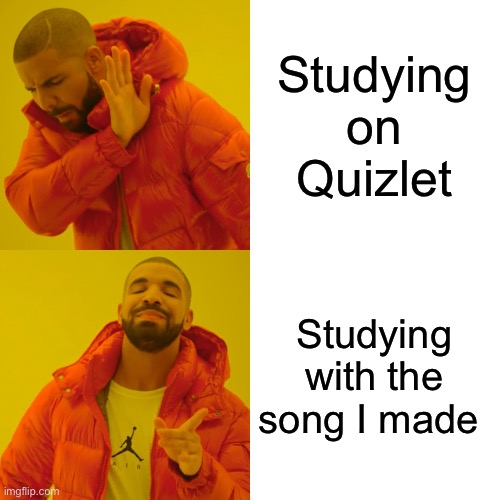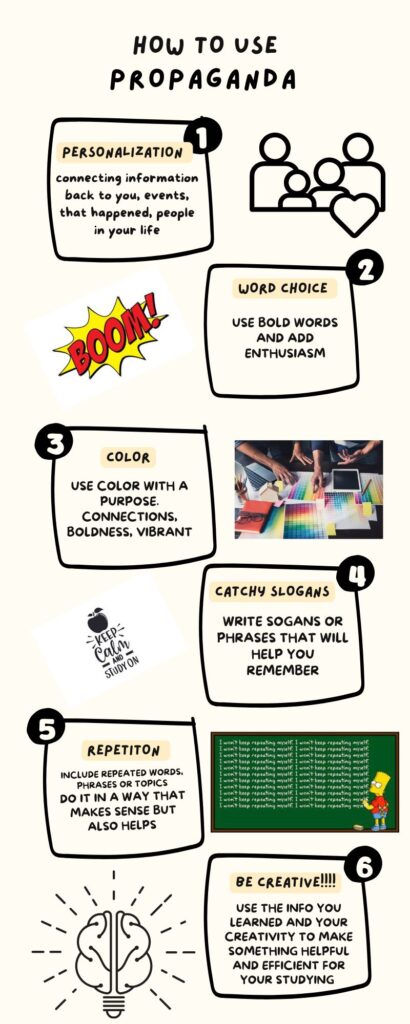By Ariel Chism
The propaganda effect is something that occurs when individuals are usually repeatedly told something (whether it is true or not) and happen to believe it. (1) Propaganda can be a great tool to use when studying as it allows for individuals to use their creativity and knowledge they learned on a topic and put it into some multimedia form.

I know what you’re thinking, propaganda is used in wars and politics, all things unrelated to school. However, propaganda can happen anywhere with anything. In movies having a certain view on a character is influenced by how that character is portrayed and talked about. (1) Using propaganda as a tool can be just as effective as using it for persuasion. There are many techniques that you can use to make propaganda efficient when studying for something. Some include using repetition, this can include coming up with a short and simple saying that you can remember. Simplification is very important, fitting something in a short sentence that has meaning can help you remember a variety of things. (2) A lot of these techniques refer to persuasion and a general population of people, but when using it for studying purposes you can look at the information you need to study and find ways to create sayings or catchy phrases to help you learn and remember. With that, a few other tools that can help are symbols, including pictures and songs. (3) Similarly, using bold, strong language such as, “wonderful, extreme, very” helps you remember what you are saying or learning compared to using weak language or not really adding any enthusiasm to what you are creating. According to the American Historical Association, “The skilled propagandist also knows the techniques of ‘making ideas stick.’” (3) Something very small but equally important is the use of color. When making something like a poster or infographic, color is important. Use bold colors or colors that may make sense with the information you are using. (2) Putting all of these techniques together can help you create something with the information you are learning and remember it more efficiently. It doesn’t require you to sit at your desk and reread notes you took two weeks ago and hope you can remember something on the page. With that, when creating something, not only does that include symbols and slogans but also, finding things that are personalized for you will also help you remember information better. Personalization is a big part in using the propaganda effect to your advantage. (2) Connecting information you are learning to yourself, things you like, etc. helps make the information more personal and easier to remember. Think of connecting a topic with an event that has occurred in your life or relating a topic to someone you love. That can help you remember and connect things that you already have stored in your brain that you won’t forget.
In relation to the propaganda effect, the illusory truth is something very similar. We remember a lot of things we have been told throughout the years just by hearing it several times. For example, when someone says “vitamin C prevents the common cold” (5) Have you really ever looked it up to see if it is true? Probably not. This is because we have just been told that statement so many times that we believe it. The repetition of that statement is the reason we think having vitamin c prevents us from getting sick. The illusory truth is similar to propaganda because both are ways to influence and persuade people, which in turn, helps them remember whether they really care to or not. That is why repetition with information and putting it into a simpler form is a very important part when using propaganda as a study tool.
How do you put it all together? When making a form of media using the propaganda effect it depends on how you think you would learn best. If you want to make a song and are able to do it effectively with information, do that. Write lyrics relating to the topic you are studying, make sure you can add rhymes or music in the background. We tend to remember lyrics to songs better than anything else we read or hear, so making it as close to a song of our interest as possible will have the best outcomes. When making posters or infographics use bold colors and fonts. Making catchy phrases or relating topics, including pictures can help you relate and remember the information. You can make videos or TikToks, relating the information to a sound or making up a script with the information in it to help you remember. The way you create any of the media is a preference on how you would prefer to learn. If you want to make a rap song or a comedy script, do it. The most important part is to use the techniques discussed and input what you are studying in an effective way for you!

References:
(1) Natiello, C., Natiello, C., 9, R. V. I. J., 15, S. M., 26, A. L. M., 25, A. E. M., 25, amp5554 M., 25, A. E. B. M., & 19, J. K. M. (2018, March 4). Psych 256: Introduction to cognitive psychology (SP18 – 003). PSYCH 256 Introduction to Cognitive Psychology SP18 003. https://sites.psu.edu/psych256sp18003/2018/03/04/h/
(2) The psychology behind effective propaganda techniques. FasterCapital. (n.d.). https://fastercapital.com/topics/the-psychology-behind-effective-propaganda-techniques.html
(3) What are the tools of propaganda?: AHA. What Are the Tools of Propaganda? | AHA. (n.d.). https://www.historians.org/about-aha-and-membership/aha-history-and-archives/gi-roundtable-series/pamphlets/em-2-what-is-propaganda-(1944)/what-are-the-tools-of-propaganda
(4) Fazio, L. K., Brashier, N. M., Payne, B. K., & Marsh, E. J. (2015). Knowledge does not protect against illusory truth. Journal of Experimental Psychology: General, 144(5), 993–1002. https://doi.org/10.1037/xge0000098
(5) Anderson, D., Gutierrez, A., Smyth, D., Morton, A., Sansen, K., & Palmer, J. The Cognition of Propaganda.
Hi Ariel! I really enjoyed your post, I think it gives a lot of good insight and explanation and you did a great job at giving a variety of examples in connection to your topic! This post made me consider how propaganda has been applied to my life or school work. I remember making songs or phrases to help me in geography class in high school. Have you ever applied this concept of propaganda to your learning? If so, what class and how did you do it?
I feel like I most definitely applied it in grade school but can’t really remember off the top of my head. I know in some of my exercise phys classes I had to make infographs similar to the second picture in my blog!